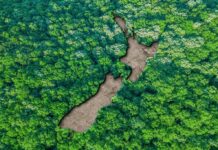The number of companies publicly disclosing environmental data through the CDP platform has soared 24 per cent in the last year, with over 23,000 listed companies worldwide publicly reporting on their environmental performance.
The annual update from the increasingly influential disclosure platform confirmed that listed companies that collectively boast a market capitalisation of $67tr, accounting for over two thirds of total market capitalisation, now provide some form of environmental impact data on their business through the platform.
The USA, China, and Japan continue to make up the top three disclosing countries, but there was also substantial growth in Asia where both South Korea and Cambodia more than doubled the number of disclosing companies compared to 2022.
CDP works on behalf of investors to write to listed companies requesting their provide information on their carbon emissions, impact on water and forests, supply chain management, and plans to enhance their environmental performance. The resulting disclosures provide investors and other stakeholders with comparable information on the environmental and climate-related risks and opportunities a business faces.
The platform has gained significant prominence in recent years, as more and more investors call on listed firms to provide accurate environmental data. Today’s report confirms that the number of firms disclosing through the platform has now increased four-fold since the Paris Agreement in 2015.
However, CDP warned that disclosures from the vast majority of listed businesses remained incomplete, with only one per cent of firms providing data on all three of its focus areas: climate change, water security, and deforestation.
The update also confirms that growing numbers of public sector bodies are reporting through the platform, with disclosures now provided by over 1,100 city, state, and regional governments in close to 100 countries.
Sherry Madera, chief executive at CDP, said it was clear that environmental reporting had become a mainstream practice for the vast majority of the world’s largest businesses. “With over 23,000 businesses disclosing through CDP this year, it is clear that sustainability – and the data that underpins it – is not a ‘nice to have’, but an essential part of long-term success in the business community that is showing no sign of slowing down – nor should it,” she said. “IPCC forecasts on our world’s climate trajectory making for grim reading in what is set to be the warmest year on record. To take decisive action for the future of our planet, we need organisations to be measuring and managing where they are on their sustainability journey through disclosure.”
Michelle Papayannakos, BBC group senior sustainability manager, said a standardised approach to carbon reporting and environmental disclosures can play a critical role in enabling the development of effective decarbonisation strategies.
“CDP has really helped the BBC to engage internally on climate change, increasing our maturity as an organisation and providing a robust valuation of our current activities,” she said. “CDP is also a core part of our decarbonisation strategy for our supply chain, asking our top 450 suppliers to also disclose has enhanced engagement, transparency of data and most importantly, led to a ripple effect of development and action on climate change.”
The news comes just days after the Taskforce for Climate-related Financial Disclosures disbanded after its recommendations on disclosure best practices were adopted by the International Sustainability Standards Board (ISSB), which now provides a global standard for corporate sustainability reporting.
CDP said its requests for information from listed companies were already aligned with the TCFD recommendations and that it would align its 2024 questionnaire with the ISSB’s climate disclosure standard (IFRS S2). From next year it will also start to reflect the recently launched Taskforce on Nature-related Financial Disclosures (TNFD) Framework in its information requests, it said.
“CDP recognises its unique role and responsibility to accelerate action as the driving force for collecting primary environmental data from organisations for over 20 years,” said Madera. “As the demand for sustainability data gets increasingly intense and complicated for organisations to negotiate, we have the expertise to prepare organisations – large and small – to meet the needs of their stakeholders. This is why in 2024, we will be making it easier and quicker to disclose and access data, through a new framework on a new and enhanced technology platform.
“These improvements will enable CDP to continue to push boundaries in environmental reporting and helps organisational leaders deliver impact for their company and for the planet.”
Emmanuel Faber, chair of the ISSB, welcomed the alignment between the CDP platform and the ISSB’s new standards.
“The demand from global capital markets for robust, consistent and accurate climate-related information is higher than ever, and with it the need for a disclosure eco-system that is easy to navigate for companies,” he said. “CDP’s work towards alignment with the IFRS S2 is incredibly welcome and timely, as it will further ease the reporting burden for thousands of companies, moving us one step closer to a common language for disclosures, while improving the consistency of climate-related information for investors and accelerating their access to this data.
“As companies prepare to implement the ISSB standards, it is positive to see yet another year of growth in voluntary disclosure through CDP.”
Keep up to date with all the latest green business news by signing up to the free Daily and Weekly BusinessGreen Newsletters.










